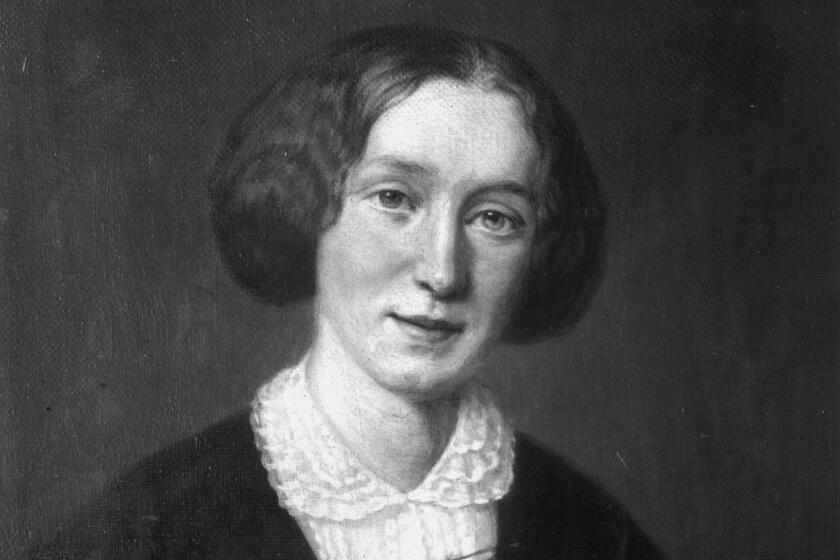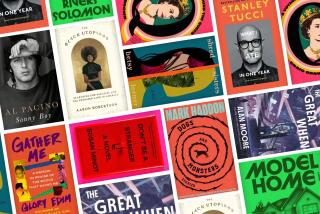16 meaty book series to get you through coronavirus stay-at-home orders
By now you have binge-watched your way through “Tiger King,” “Pandemic” and “Schitt’s Creek.” You’re done trying to be productive but maybe ready for something a little more sustaining. It might be time to immerse yourself in the world of a multivolume book series — a universe with a wild diversity of options, each tailored to your particular taste for distraction. Here’s a list of recommendations for books grouped by genre (with further reading suggestions too) that can easily soak up the isolated weeks (months?) ahead.L.A. gumshoes
Michael Connelly’s Harry Bosch. You haven’t read the books that inspired the Amazon TV series? Get busy — there are 22 of them. Connelly’s Bosch is so hyper-local, newcomers may need an L.A. neighborhood map to follow his trail. The author’s gift to the genre is his experience as a police reporter in both Florida and L.A.; his intricate plots are grounded in grit, humanity and telling detail.
Tour L.A. through the eyes of novelist Michael Connelly’s relentless detective, Harry Bosch.
Ross Macdonald’s Lew Archer. For years Macdonald’s detective was eclipsed by the more hard-boiled sleuths of Dashiell Hammett and Raymond Chandler. Now he’s been resurrected in three Library of America volumes. Archer solves crimes with the instincts of a psychologist and the conscience of a priest, and the mid-20th century Southern California setting is a wonderful ride in the Wayback Machine.
Walter Mosley’s Easy Rawlins. Maybe you saw the Denzel Washington version of Mosley’s Easy Rawlins in the 1995 movie “Devil in a Blue Dress,” but the 14 Easy Rawlins books are a much deeper dive into L.A. history, as Rawlins, an African American detective, walks both sides of the city’s color lines during the tumultuous decades of postwar America.
Steph Cha’s Juniper Song. Song is a 20-something detective who follows her nose wherever it leads, from Hollywood’s wealthy enclaves to Koreatown. Her three books (so far) capture L.A. as it exists today — multicultural, modern and gritty as ever.
Other options: Joe Ide’s IQ series, Joseph Wambaugh’s Hollywood Station novels, T. Jefferson Parker’s Charlie Hood books.
Books about nature to read while avoiding the coronavirus — from classics by John McPhee and Annie Dillard to the upcoming “Book of Eels.”
British sleuths as seen on TV
Ann Cleeves’ Vera Stanhope. The author thought she was writing a literary novel when Vera Stanhope, a police detective with a dismal fashion sense and a taste for whiskey, showed up and crashed a funeral. Nine books later, Vera and her crew of Northumberland crime solvers have millions of fans, and the books are the basis for the excellent “Vera” British TV series starring Brenda Blethyn.
Colin Dexter’s Inspector Morse. Dexter was trapped in rainy Wales on vacation when he wrote the first of 13 books about a renegade detective on the Oxford police force. His Morse books feed ravenously on the class prejudice and envy in English academia, and have inspired three great television series — “Inspector Morse,” “Inspector Lewis” and “Endeavour.” The Morse of the books is even more wayward and dissolute than the TV version, but there is a Sgt. Lewis to rein him in.
Ian Rankin’s Inspector Rebus. John Rebus, detective for the Edinburgh, Scotland, police force, is one of contemporary detective fiction’s great creations — profane, duplicitous, intermittently alcoholic and utterly devoted to solving crimes. The 22 books in the series capture contemporary Edinburgh so effectively that they have inspired Rebus-themed bus tours in Scotland.
James Runcie’s Sidney Chambers. If you have drooled over the TV version of Sidney Chambers, the crime-solving English vicar on PBS’ “Grantchester,” you may be surprised by the books they’re based on. Runcie’s series follows the police procedural form, but his books are also astute portraits of village life and meditations on the predicament of religion in a secular age. (Runcie’s father was the archbishop of Canterbury.)
Other options: Ngaio Marsh’s Inspector Alleyn series, Agatha Christie’s Hercule Poirot and Miss Marple series, David Peace’s Red Riding Quartet.
Eight great very long books you finally have time to read if you’re under coronavirus self-quarantine or just embracing social distancing.
Literary fiction
Hilary Mantel’s Wolf Hall trilogy. In real life Thomas Cromwell, Henry VIII’s political fixer, was an opportunist and a henchman; British author Mantel transformed the bones of his life into a more sympathetic portrait of a fully fleshed-out human being. “Wolf Hall” and “Bring Up the Bodies” both won the Man Booker Prize. The third installment, “The Mirror & the Light,” published last month after years of anticipation, brings Cromwell’s story to a heart-stopping, head-chopping close.
Patrick O’Brian’s “Master and Commander” series. Even landlubbers adore this 21- book series about two comrades in the British navy during the Napoleonic wars. “Lucky Jack” Aubrey is a brash, risk-loving British naval officer; his foil is the brooding Stephen Maturin, ship’s physician, naturalist and spy. Their journeys take the reader onto the high seas and into the further reaches of a still-pristine natural world.
Marilynne Robinson’s Gilead trilogy. Robinson chronicles the life of small-town Iowa minister John Ames, his wayward wife and his son in three award-winning novels, “Gilead,” “Home” and “Lila.” Spanning two centuries, from Iowa’s violent abolition years to the secular confusion of the present day, these stories are grounded in a profound spirituality and humanity.
John le Carré’s George Smiley series. Maybe you saw the movie “Tinker, Tailor, Soldier, Spy,” but have you read the books? Le Carré, a disillusioned British intelligence officer, modeled his trilogy on the real-life hunt for a traitor in the British secret service, and his mole hunter, George Smiley, is the apotheosis of dogged determination in the face of double-dealing and betrayal.
Other options: Jane Gardam’s Old Filth trilogy, Jane Smiley’s Last Hundred Years trilogy; Pat Barker’s Regeneration Trilogy; Paul Scott’s Raj Quartet, Elena Ferrante’s Neapolitan Novels.
11 authors, from Laila Lalami to Jonathan Lethem, on the books they might finally read in quarantine
Including Lawrence Block, E.M. Forster, Dostoyevsky and lots of “Middlemarch”
History, written and drawn
Taylor Branch’s “The King Era” books. Branch’s monumental three-volume biography of the Rev. Martin Luther King Jr. — “Parting the Waters,” “Pillar of Fire” and “At Canaan’s Edge” — took the author 24 years to complete. The result is both an insightful, compassionate biography and a sweeping survey of the civil rights years.
Rick Atkinson’s “Liberation Trilogy.” Atkinson had a stellar career as a journalist, then switched gears and became an author of prize-winning works of history. His World War II books showcase his facility with research, gift for synthesis and talent for storytelling. “An Army at Dawn,” “The Day of Battle” and “The Guns at Last Light” have won multiple prizes and will take readers back to a time even more fraught than our own.
John Lewis’ “March” trilogy. Maybe you need a breather from pages and pages of print, or maybe you have a young person in the house. Try out this three-volume graphic history from the perspective of Congressman John Lewis, a civil rights pioneer. Written by Lewis and Andrew Aydin, illustrated by Nate Powell, the trilogy won the National Book Award for young people’s literature in 2017, but any lover of history and graphic art will enjoy it.
“Berlin,” by Jason Lutes. This brilliant graphic novel follows more than 40 characters as they struggle to survive 1920s Germany. First published in three installments, a recent omnibus edition follows the transformation of Berlin from decadent cultural metropolis to a city in the total grip of fascism. Based on historical events, “Berlin” will convince you (if you needed convincing) of history’s disturbing tendency to repeat itself.
Other histories: The multivolume Oxford History of the United States.
Gwinn, a Pulitzer Prize-winning journalist who lives in Seattle, writes about books and authors.
Sign up for the Los Angeles Times Book Club
More to Read
Sign up for our Book Club newsletter
Get the latest news, events and more from the Los Angeles Times Book Club, and help us get L.A. reading and talking.
You may occasionally receive promotional content from the Los Angeles Times.








